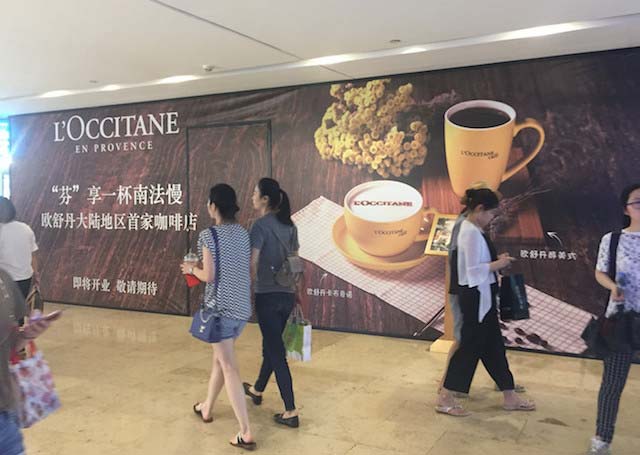
Recently, French beauty product retailer L’Occitane is opening the first Café in mainland China (Nanjing). As the brand competition becomes more and more fierce, skincare brands have to develop various by-businesses to attract and maintain more customers.
The L’Occitane Café in B1 floor of Nanjing Deji Plaza is still under decoration. The decoration enclosure plate has continued L’Occitane’s Provence style: share slow and leisure lifestyle in southern France.
The B1 floor of Nanjing Deji Plaza in Xinjiekou Metro Station has high passenger flow volume. Every passenger going by the L’Occitane Café is curious about this new shop. Not far away from the Café, you will find the L’Occitane store. The Café will open in early July. Among nearly 200 direct sales chain stores in Mainland China, the store in Deji Plaza has relatively high sales volume.
With many passengers coming and going here, Deji Plaza is committed to becoming a collection and distribution center of high-end cosmetics. The stores gathering here hardly need to worry about their sales volume. Maybe this helps us understand why Nanjing Deji Plaza is chosen as the site for the first L’Occitane Café in Mainland China.
Before this, L’Occitane Café has opened five stores in Tokyo, Macao, Taipei and Moscow. New types of Café and SPA services in luxury hotels have become highlights in many companies’ financial report. Both of them are designed for attracting customers to spend more time there. The financial report of the first quarter in 2017 shows that Chinese market has become the biggest growth engine for L’Occitane, accounting for 64.6% of contribution to the company’s sales growth.
In spite of stable sales volume, the brands in Deji Plaza still struggle to tell better stories in limited space with limited attention resource. In such situation, a Café where customers can spend more time seems a nice idea.
In fact, it is not surprising for cosmetic brands to open a Café. Innisfree flagship store on Nanjing East Road in Shanghai has also opened a DIY coffee shop where customers can not only enjoy coffee and desserts but also participated in some interactive activities such as skincare classes and DIY skincare products. Earlier on, some lady-oriented niche brands boasting their natural products with plant extracts also open coffee areas for customers to take a rest or have more interactive activities.
It has become a trend for natural skincare brands to open petty bourgeoisie coffee shops. Moreover, Chanel also opened a pop-up café before. Instead of selling coffee, these brands actually expect to create more opportunities to interact with their customers. Choosing and buying can be done in a flash, but the real driving force behind them has a lot to dig.
Yet, opening a café is not always the best choice for skincare brands. After all, not every brand is so rich like L’Occitane to open a café in Deji Plaza where the rent is extremely high. How to tell an appealing story? It is a question that all sorts of brands in Deji Plaza have to face every day.
A traditional trick is to invite a superstar. A cheaper and more common way is to invite a famous creative director such as Mr. Kevin to share his knowledge and experience on some popular and frequently asked questions like “are you removing your makeups correctly?” or “what are the basic steps for moisture retention before putting on makeups?” and so on. Now some brands also arrange for a live streaming hosted by an online beauty makeup celebrity at the same time.
The most economic and innovative way is to set up an interactive brand terminal machine. L’Occitane has set up a gift machine on which you can get a sample product by scanning the registration QR to become an L’Occitane member.
Under the background of real economic downturn, the cosmetics industry is one of the few varieties to keep a growth in sales. With the relatively lower unit price and high repurchase rate, cosmetic products prove giant market potential.
Source: 36Kr